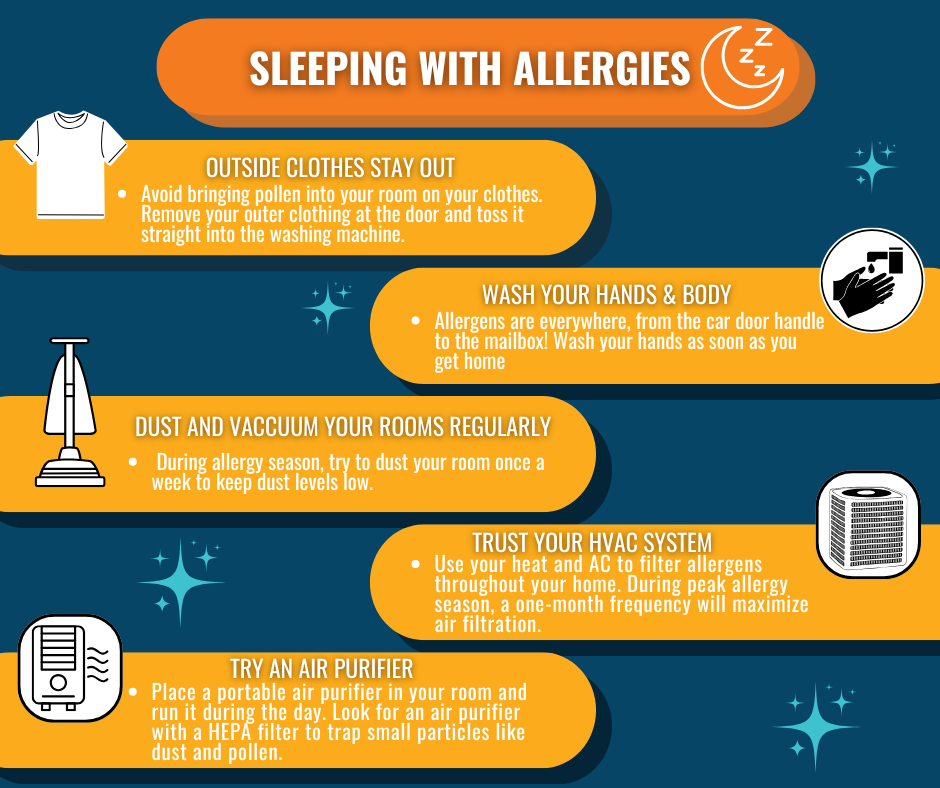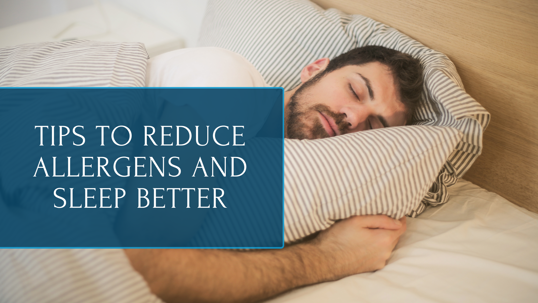People with seasonal allergies often dread the arrival of spring blooms, summer hay fever, and fall mold. Despite efforts to keep them out, pollen and mold spores still find their way into homes.
While maintaining an allergy-free home is impossible, you don’t have to settle for sleepless nights during allergy season. Learn how regular cleaning and a well-maintained HVAC system can help you get a full night’s sleep during Orlando’s extensive allergy season.
Common Causes of Bedroom Allergies
Approximately one in four adults in the U.S. experience seasonal allergies. Top allergens include:
- Tree pollen
- Grass pollen
- Ragweed
- Mold spores
While these allergens are experienced outdoors (and can be brought inside on your clothing or through open windows), inflammation from seasonal allergens may make you more sensitive to perennial indoor allergens like dust, pet dander, or mold.
Many adults are allergic or sensitive to multiple allergens, so you may experience allergy symptoms at night, even when “seasonal” allergies end.
Read more: Smart Ways to Improve Indoor Air Quality

Allergies and Sleep: Why It’s So Hard to Get Shut-Eye
You might notice your symptoms are worse when you sleep. Allergy symptoms tend to be more severe at night due to the increased exposure to the indoor allergens we listed above, plus nighttime’s elevated histamine levels.
For some individuals, lying down can exacerbate symptoms due to airway anatomy.
How to Sleep Better with Allergies
If you’re experiencing sleep-limiting allergies in the bedroom, follow these tips!
- Outside clothes stay out – Avoid bringing pollen into your room on your clothes. Remove your outer clothing at the door, store it in the garage, or toss it straight into the washing machine.
- Use your HVAC system – Replace your HVAC’s air filter every one to three months. During peak allergy season, a one-month frequency will maximize air filtration.
Check your owner’s manual or contact Pro-Tech Air Conditioning & Plumbing Service to see if a HEPA filter is compatible with your system. Finally, use your heat and AC frequently to prevent debris from accumulating inside an idle unit.
- Try an air purifier – Place a portable air purifier in your room and run it during the day. Look for an air purifier with aHEPA filter to trap small particles like dust and pollen.
- Wash your hands and body—Pollen and other allergens cover every outdoor surface. Touching surfaces, from the car door handle to the mailbox, will transfer contaminants to your hands and body. Wash your hands as soon as you get home, and avoid touching your mouth, nose, and eyes until your hands are clean.
If you’ve been outside for an extended period, shower and blow your nose to clear pollen from nasal passages, hair, and skin.
- Dust your room regularly – Bedrooms accumulate a lot of dust because we spend a lot of time in them. Between sleeping, relaxing, and getting ready for the day, our activity causes skin cells, hair, and fibers from our clothes to collect on the floors and surfaces. Dust your bedroom at least once weekly to prevent a build-up of allergy-inducing dander.
Does Sleeping with a Humidifier Help Allergies?
It can! Using a humidifier helps to maintain ideal humidity in a dry space. However, too-high humidity levels can exacerbate allergies, particularly for those sensitive to mold and dust.
What Is the Best Temperature and Humidity for Sleeping?
The ideal temperature and humidity for sleeping are 60-67 degrees Fahrenheit, and indoor humidity is 30% to 50%.
Reduce Indoor Allergens with the Winter Garden and Kissimmee Area HVAC Specialists
Orlando homeowners rely on Pro-Tech Air Conditioning & Plumbing Services for all home service needs. We can optimize your HVAC system and filtration to prevent indoor allergens, lower energy costs, and keep your home comfortable all year.
Contact us online or call 877-416-4727 to schedule an appointment!

